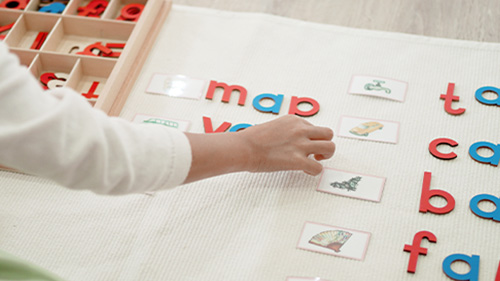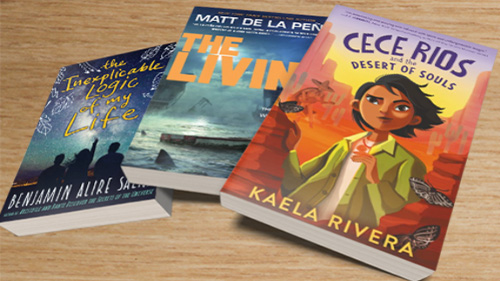What if we taught composition like Bob Ross teaches painting?
Back in my hometown, it was a rite of passage at the age of twelve to get a paper route. There was no status associated with it, nor did it come with...
AP & Honors Mathematics
Explore Wiley titles to support both AP and Honors mathematics instruction.
Literacy Skills & Intensive Reading
Connections: Reading – Grades 6–12
Empower student success with a proven intensive reading program that develops strong reading skills in striving readers.
Drama, Speech & Debate
Basic Drama Projects 10th Edition
Build students’ confidence and competence with comprehensive, project-based theatre instruction.
Literature
Connections: Literature
Support learners as they study dynamic, relevant texts and bring the richness of diverse voices to students through literature.
Literature & Thought
Develop critical thinking, reading, and writing across literacy themes, genres, historical eras, and current events.
Language Arts
Vocabu-Lit® – Grades 6–12
Help students build word power using high-quality contemporary and classic literature, nonfiction, essays, and more.
Connections: Writing & Language
Help students develop grammar, usage, mechanics, vocabulary, spelling, and writing and editing skills.
Reading/English Language Arts
Measuring Up to the English Language Arts Standards
Incorporate standards-driven teaching strategies to complement your ELA curriculum.
English Language Learners
Measuring Up for English Language Learners
Incorporate research-based best practices for ELLs with an approach that includes a focus on language acquisition strategies.
Mathematics
Measuring Up to the Mathematics Standards
Incorporate standards-driven teaching strategies to complement your mathematics curriculum.
Foundations
Measuring Up Foundations
Help students master foundational math skills that are critical for students to find academic success.
Science
Measuring Up to the Next Generation Science Standards
Give students comprehensive NGSS coverage while targeting instruction and providing rigorous standards practice.
Assessment
Measuring Up Live
Deliver innovative assessment and practice technology designed to offer data-driven instructional support.
For a better website experience, please confirm you are in:
3 min read
 Kristian Kuhn
Sep 19, 2022 11:22:47 AM
Kristian Kuhn
Sep 19, 2022 11:22:47 AM

Given that lately I am as burnt out as they come, I found myself wanting to do something unusual.
For years, I have heard about this abbey where monks make bread.
Imagine it…thirty-something monks having taken a vow of silence, silently making bread all day long.
Contrast that scene to the daily grind of classroom living.
So, at the very last minute I decided to book a weeklong retreat to enjoy a bit of silence and the endless aroma of fresh baked bread.
During one of our evening meditations, my mind wandered and landed upon this thought—just exactly how much learning has occurred in my classroom this academic year thus far?
And my anxiety went through the roof.
While my AP® students are primarily rockstars, my Regents students are doing next to nothing.
The disengagement, apathy, anti-intellectualism, and all-around sense of being checked out is killing me!
And then I had another drifting thought…
Upon returning to school on Monday, you need to begin your unit on Gatsby.
And sometimes in meditation, the monkey-mind attaches itself to the wreckage of the future.
And my next thought said this—but only 3 out of 24 students submitted their Othello essay in Block I, and you got a whopping 5 out of 26 in the other section.
I’m far from achieving any state of serenity and I’m fully stuck in the muck and mire of what I was trying to escape; but in that moment, I needed to answer a few questions:
Does Gatsby really matter?
The reality of the matter is this—Gatsby would just yield more of the same-old-same-old as far as perpetuating the behaviors I am seeing.
What, then, feels aligned?
And it occurred to…Why don’t we talk about the issue head on instead of cramming prescribed curriculum down these kid’s throats?
I think that the question all our students need to consider is this: to what extent are your current motivational levels aligned with your future goals?
And bingo…here’s the unit I built around that quandary.
First, students take an online self-survey that thoroughly assesses and appraises their level of motivation.
My kids were super into this and it proved to be very illuminating.
Upon completing the survey, students are given a composite score (like for personality tests) and I had them write a reflection that broke down what the results speak to.
From here, we dove into a few articles (listed below) that gave a quasi-psychological dive into the essential question and then we hosted a Socratic Seminar. The personal sharing was wonderful and insightful
But the hidden gem—the next step is to get students to write.
In effect, this essay is one-part personal reflection and one-part synthesis.
For those of you not familiar with my work, I have developed a few writing templates—that in my estimation—help demystify the writing process for our students.
In brief, my templates can be used across the expository modes so that all the second-guessing gets eliminated from the process.
Further, I’m a huge champion of “Bob Ross-ing” instruction.
In other words, when I work with teachers, I always encourage them to position themselves as the expert writer in the classroom and to provide plenty of exemplars and models to their students.
So, in the video you will see me walking you and your students through the process of writing the essay while incorporating my templates.
In an era when we talk a lot about the need for SEL, this unit felt relevant and aligned.
Many of the responses were raw, vulnerable, and gut-wrenching.
But most importantly, real learning was happening yet again in the classroom.
Man, how I have missed that.
Whereby Othello yielded me 8 out of 50 essays submitted on time—this unit witnessed 46 out of 50.
Big difference.
For me, this unit harkened back to why I got into education in the first place.
It reignited a fire and rekindled something that got lost along the way.
Most importantly, it hammered home one big point of clarity—instruction must be meaningful and relevant if we have any hopes whatsoever of combating the current levels of disengagement and apathy.
Supplementary Articles:
12 Habits of Extraordinarily Motivated People, Peter Economy
9 Types of Motivation That Make It Possible to Reach Your Dreams, Dylan Buckley
The Psychology of Laziness, Neel Burton, M.D.
Kristian Kuhn is currently is in his 20th year teaching English courses in Upstate New York at both the secondary and collegiate level. In addition to teaching, Kristian offers courses and seminars with the focus of teaching teachers how to teach writing. He received his graduate degrees in English and education from Brown University. In his free time, Kristian loves to spend his time out on the water paddle boarding. To learn more about his Masterclass entitled Teaching Teachers How to Teach Writing, visit his webpage here!

Back in my hometown, it was a rite of passage at the age of twelve to get a paper route. There was no status associated with it, nor did it come with...

Over the course of my career as a middle school ELA teacher, I’ve graded more writing pieces than I can count. I’ve graded late into the night, on...

Back in the days before television screens were flat, before we had televisions in every room of the house, before crazy high screen resolutions let...

The summer break is winding down, and soon you'll be setting up your classroom for another year of learning adventures. Whether you're a first-year...

In American K-12 public schools, English language learners (ELLs) make up over 10% of students. 10% may not sound like much, but that’s over 5...

Last week during her first week of school, I had a conversation with a fresh-out-of-college-first-year teacher who was spending her evenings typing...

In my first period class of sophomores at a high school on the Southwest side of San Antonio, I had one White student, one Muslim student, and the...

ELA Teacher and creator of languageartsteachers.com Laura Kebart walks you through 10 easy ways to integrate vocabulary instruction in your Middle...

Laura Kebart will help you connect novel studies to cross-curricular goals, enhancing engagement without sacrificing core skills. Watch the webinar...

As secondary English teachers, we know how important it is for our students to learn to write well. We also know that oftentimes means we have over a...

In the previous blog posts of this series, I shared how I’ve transformed my English classroom into a collaborative space where students aren’t just...

The most beautiful part of January isn’t the snow or the magical lighted displays around town, but instead it’s the chance for a new beginning....
